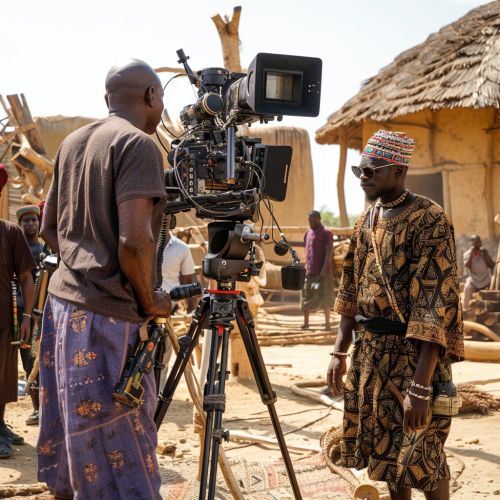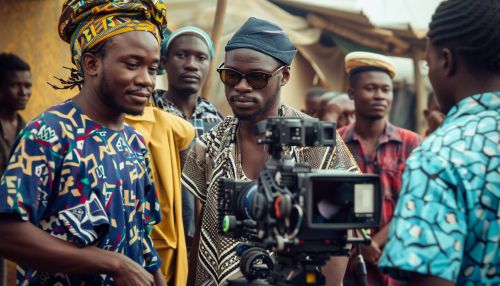Cinema of Africa
History of African Cinema
The Cinema of Africa encompasses a rich and diverse range of films and filmmaking practices that reflect the continent's complex history, cultures, and social issues. African cinema has evolved significantly since its inception, influenced by colonial history, post-colonial developments, and contemporary global trends.
Early Beginnings
African cinema's roots can be traced back to the early 20th century, during the colonial era. The first films made in Africa were predominantly by European filmmakers, often depicting the continent through a colonial lens. These films were characterized by their exoticism and often reinforced stereotypes about African people and cultures.
Post-Colonial Cinema
The post-colonial period marked a significant shift in African cinema. With the wave of independence movements across the continent in the 1950s and 1960s, African filmmakers began to emerge, creating films that reflected their own perspectives and experiences. This era saw the rise of influential filmmakers such as Ousmane Sembène, often referred to as the "father of African cinema." Sembène's films, such as "Black Girl" (1966) and "Xala" (1975), addressed social and political issues, challenging colonial narratives and highlighting the struggles of post-colonial African societies.
The Golden Age
The 1970s and 1980s are often considered the golden age of African cinema. During this period, numerous filmmakers from across the continent gained international recognition. Directors like Djibril Diop Mambéty from Senegal, Souleymane Cissé from Mali, and Med Hondo from Mauritania produced groundbreaking films that explored themes of identity, tradition, and modernity. These films were characterized by their innovative storytelling techniques and a strong emphasis on visual aesthetics.
Contemporary African Cinema
In recent decades, African cinema has continued to evolve, with filmmakers exploring new genres and styles. The rise of digital technology has made filmmaking more accessible, leading to a proliferation of films from various African countries. Contemporary African cinema is marked by its diversity, with filmmakers addressing a wide range of issues, from political corruption and social justice to personal stories and cultural heritage.
Regional Cinemas
African cinema is not monolithic; it varies significantly across different regions of the continent. Each region has its own unique cinematic traditions and influences.
North African Cinema
North African cinema, particularly in countries like Egypt, Algeria, and Morocco, has a long and storied history. Egyptian cinema, often referred to as the "Hollywood of the Arab world," has been a dominant force in the region since the early 20th century. Filmmakers like Youssef Chahine and Chadi Abdel Salam have made significant contributions to the region's cinematic landscape. North African films often explore themes related to Arab identity, colonial history, and contemporary social issues.
West African Cinema
West African cinema, particularly in countries like Senegal, Mali, and Burkina Faso, has produced some of the continent's most acclaimed films. The region is known for its strong tradition of storytelling and its emphasis on social and political themes. The FESPACO film festival, held biennially in Burkina Faso, is one of the most important events in African cinema, showcasing films from across the continent.
East African Cinema
East African cinema, including countries like Kenya, Uganda, and Tanzania, has seen significant growth in recent years. The region's filmmakers often address issues related to post-colonial identity, social change, and cultural heritage. The rise of digital technology has also played a crucial role in the development of East African cinema, making it easier for filmmakers to produce and distribute their work.
Southern African Cinema
Southern African cinema, particularly in South Africa, has a unique history shaped by the country's apartheid past. South African filmmakers have produced powerful films that address the legacy of apartheid, racial inequality, and social justice. Directors like Gavin Hood and Neill Blomkamp have gained international recognition for their work, bringing global attention to the region's cinematic achievements.


Themes and Styles
African cinema is characterized by its rich thematic diversity and innovative stylistic approaches. Filmmakers across the continent explore a wide range of subjects, often drawing on their cultural heritage and personal experiences.
Social and Political Issues
Many African films address pressing social and political issues, reflecting the continent's complex realities. Themes such as colonialism, post-colonialism, corruption, and social justice are prevalent in African cinema. Films like "Hyenas" (1992) by Djibril Diop Mambéty and "Bamako" (2006) by Abderrahmane Sissako critically examine the impact of colonialism and the challenges faced by contemporary African societies.
Cultural Identity
Exploring cultural identity is a central theme in African cinema. Filmmakers often delve into questions of tradition, modernity, and the tension between the two. Films like "Yeelen" (1987) by Souleymane Cissé and "Timbuktu" (2014) by Abderrahmane Sissako highlight the richness of African cultures while addressing the challenges of preserving cultural heritage in a rapidly changing world.
Gender and Feminism
Gender and feminist issues are also prominent in African cinema. Filmmakers like Safia Mohamed and Wanuri Kahiu have created films that challenge traditional gender roles and highlight the experiences of African women. Films such as "Moolaadé" (2004) by Ousmane Sembène and "Rafiki" (2018) by Wanuri Kahiu address topics like female empowerment, gender-based violence, and LGBTQ+ rights.
Experimental and Avant-Garde
African cinema is not limited to conventional narrative forms; it also includes experimental and avant-garde works. Filmmakers like Jean-Pierre Bekolo and Mati Diop push the boundaries of traditional storytelling, using innovative techniques and unconventional structures. These films often challenge viewers' expectations and offer new ways of understanding African experiences.
Industry and Infrastructure
The African film industry faces numerous challenges, including limited funding, distribution issues, and inadequate infrastructure. However, there have been significant efforts to address these challenges and support the growth of African cinema.
Film Festivals and Awards
Film festivals play a crucial role in promoting African cinema and providing a platform for filmmakers to showcase their work. In addition to FESPACO, other important festivals include the Durban International Film Festival in South Africa, the Carthage Film Festival in Tunisia, and the Luxor African Film Festival in Egypt. These festivals not only celebrate African films but also facilitate networking and collaboration among filmmakers.
Funding and Support
Securing funding is one of the biggest challenges for African filmmakers. Many rely on international co-productions, grants, and support from cultural organizations. Initiatives like the African Film Development Foundation and the Pan African Federation of Filmmakers provide financial and logistical support to filmmakers, helping to nurture talent and promote the growth of the industry.
Distribution and Exhibition
Distribution and exhibition remain significant hurdles for African cinema. Many films struggle to reach wider audiences due to limited distribution networks and a lack of cinemas in some regions. However, the rise of digital platforms and streaming services has opened new avenues for distribution, allowing African films to reach global audiences. Platforms like Netflix and Showmax have increasingly included African films in their catalogs, providing greater visibility for the continent's cinematic output.
Conclusion
The cinema of Africa is a vibrant and dynamic field that reflects the continent's diverse cultures, histories, and social issues. From its early beginnings during the colonial era to the contemporary digital age, African cinema has continually evolved, producing films that challenge stereotypes, explore complex themes, and celebrate the richness of African experiences. Despite the challenges faced by the industry, African filmmakers continue to create innovative and impactful works that contribute to the global cinematic landscape.
